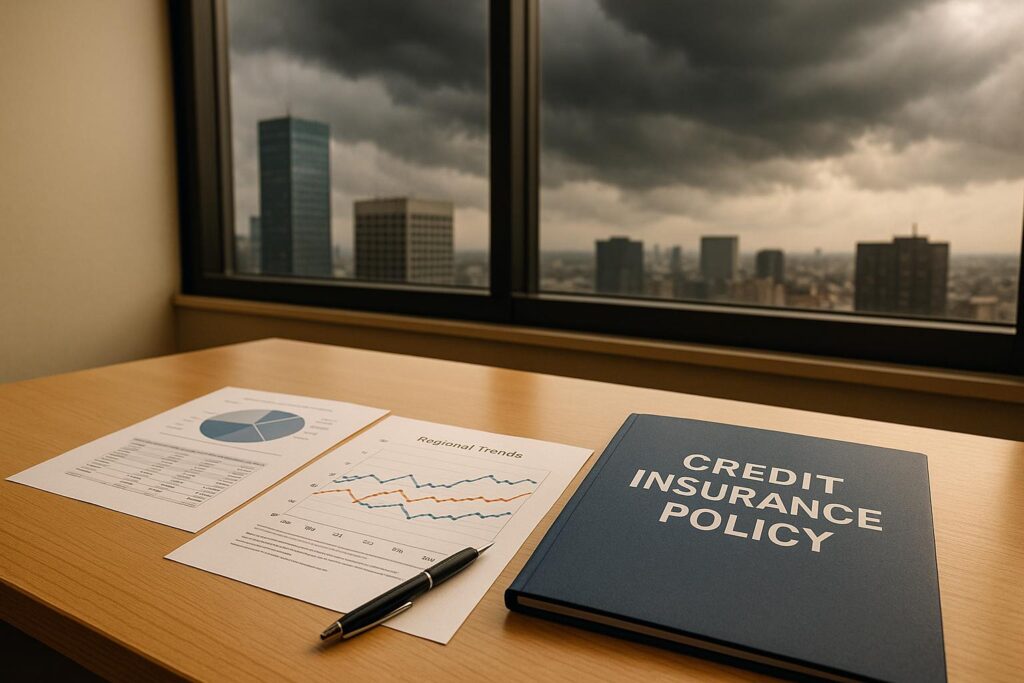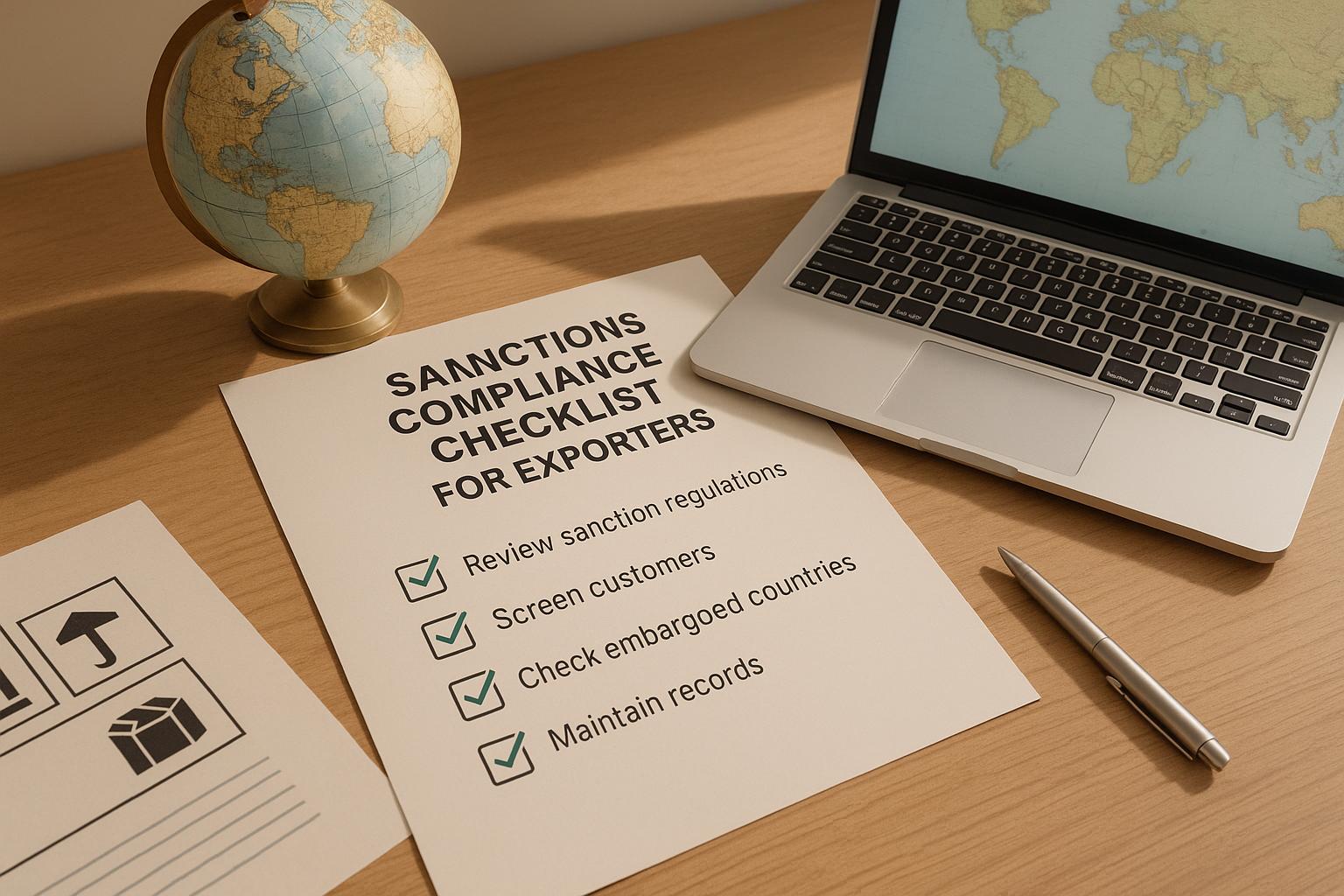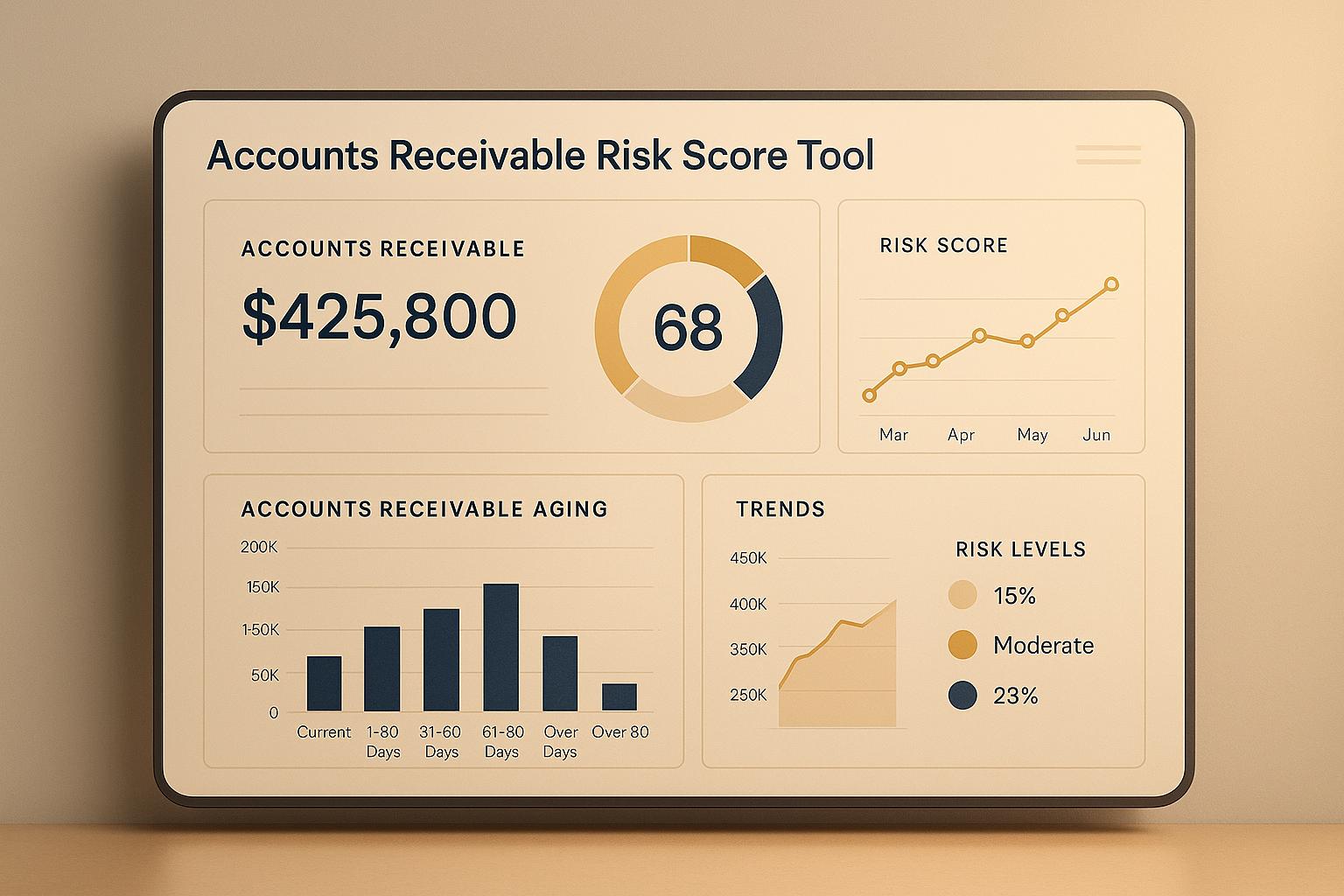Political instability can disrupt businesses globally, making regional credit insurance vital for financial protection. This insurance helps businesses manage risks like government actions, civil unrest, and economic instability that may lead to payment defaults or asset losses. U.S. companies, especially those with international exposure, face growing challenges in securing tailored coverage due to rising premiums, stricter underwriting, and regional differences in risk.
Here’s what you need to know:
- Key Risks: Expropriation, civil unrest, currency inconvertibility, government contract breaches, and sudden regulatory changes.
- Regional Variations:
- North America: Trade policy shifts increase risks.
- Latin America: Corruption and slow growth dominate concerns.
- Asia-Pacific: U.S.-China tensions reshape insurance options.
- EMEA: Conflicts and economic instability drive demand for coverage.
- Insurance Trends: Premiums typically range from 1%-3% annually. Multi-country policies are now pricier and harder to secure.
- Real-World Examples: From Russia’s asset seizures to supply chain disruptions, political risks have led to billions in claims.
To protect your business, consider tailored credit insurance from experienced providers who understand regional dynamics and can help mitigate these risks effectively.
Navigating Political Risks in a Volatile World | SCHUMANN Conference 2022
Political Risks and Regional Effects
Political risks are becoming a pressing concern for businesses operating across the globe. For U.S. companies, understanding how these risks differ by region is crucial for making smart decisions about international operations and credit insurance. The way these challenges unfold varies widely, influencing insurance pricing and claims trends.
Main Political Risks
Today’s political risks come in several forms, each capable of disrupting operations and triggering insurance claims. Among the most severe is expropriation and nationalization, where governments seize private assets for public use. A stark example occurred in 1972 when Chile nationalized U.S. copper mining operations, demonstrating the impact such risks can have.
Political violence and civil unrest pose immediate threats to business continuity, while currency inconvertibility can block companies from converting local earnings into U.S. dollars or transferring funds across borders. Another significant risk is government breach of contract, where state entities fail to uphold agreements, leaving businesses with little to no legal recourse. Additionally, taxation and regulatory changes can upend the financial viability of international operations overnight.
“When it comes to political risk, we say it could be defined to a certain extent by its unpredictability. Contrary to most other types of insurance, it’s not always possible to model this type of risk based on historic data.”
The scope of these risks is expanding. Recent data shows 94% of executives report that unexpected political risks are having a growing impact on their companies. Confidence in managing these risks has plummeted, falling from 74% to just 55% in a single year.
How Risks Differ by Region
Political risks don’t look the same everywhere, and businesses need region-specific strategies to manage them.
- North America has historically been stable, but recent shifts in U.S. trade policies have heightened concerns. Trade protectionism and government intervention are fragmenting markets, with nearly 60% of companies anticipating financial setbacks from these changes. Insurers in the U.S. are adjusting credit terms to reflect these evolving risks.
- Latin America faces a mix of challenges, from slow economic growth to corruption and the lingering effects of the COVID-19 pandemic. The region is at a pivotal moment as it balances relationships with both the U.S. and China, with 21 nations participating in China’s Belt and Road Initiative.
- Europe, the Middle East, and Africa (EMEA) present varying risk profiles. While Western Europe remains relatively stable, Eastern Europe has seen a spike in demand for political risk insurance due to Russia’s actions in Ukraine. In the Middle East, despite ongoing conflicts, projects like a $110 million renewable energy initiative in Egypt have still secured political risk coverage.
- Asia-Pacific is marked by stark contrasts. The U.S.-China strategic competition has reshaped the risk landscape, with geopolitical tensions reaching new heights. Western companies with assets in China now find it nearly impossible to secure standalone political risk insurance – something unthinkable just a few years ago.
These regional differences highlight the need for flexible credit insurance strategies tailored to specific risks.
Real Examples: U.S. Businesses Hit by Political Risks
Recent events illustrate how quickly political shifts can harm U.S. businesses. When Russia invaded Ukraine in February 2022, the political risk insurance market was caught off guard, resulting in billions in losses for Western companies.
One example of expropriation risk is Carlsberg’s Russian operations. In July 2023, Russia seized eight breweries owned by the Danish brewer, forcing the company to write down $1.5 billion worth of assets.
The aviation leasing industry also suffered massive losses when Russia seized hundreds of Western-leased planes after the Ukraine invasion. These actions led to billions in claims and reshaped how insurers assess risks in the region.
Technology companies are increasingly vulnerable as geopolitical tensions weaponize data. For instance, in 2024, U.S. actions against TikTok prompted China to retaliate by banning WhatsApp, Signal, and Threads, showing how tech firms are caught in the crossfire of international disputes.
Even supply chain disruptions can result from political risks. In early 2022, Tesla anticipated nickel price surges due to the Russia-Ukraine conflict and stockpiled inventory. Meanwhile, its Japanese supplier, Sumitomo Metal, took a more cautious approach, sticking to regular supply strategies. When nickel prices hit historic highs in March 2022, Tesla faced significant cost pressures and supply issues.
“We’ve seen a string of recent coups in Africa, growing authoritarianism in Latin America, and countries like Honduras stepping back from international agreements like the ICSID Convention. These shifts are creating turmoil for CFOs and risk managers.”
These examples demonstrate why specialized providers like Accounts Receivable Insurance focus on creating tailored risk assessments and policies. Political risks are unpredictable, and businesses need insurance solutions that can adapt to rapidly changing global dynamics while ensuring comprehensive protection for both domestic and international operations.
How Political Instability Changes Credit Insurance
Political instability is reshaping the way U.S. businesses approach credit insurance. With growing geopolitical tensions, insurers are overhauling how they price policies, evaluate risks, and manage claims. The days of easily accessible, broadly inclusive coverage are gone.
Policy Changes and Pricing
As global political uncertainty rises, insurers are revising their approach to policies. Premiums are climbing, underwriting has become stricter, and exclusions are expanding to reflect the current risk landscape.
Premiums now typically range from 1% to 3% per year, making multi-country coverage increasingly unaffordable. The fragmented nature of today’s risks means that adding coverage for multiple regions significantly drives up costs.
"We used to say to buy a policy as global in nature as you can because the marginal cost of adding more countries was extremely low or zero in some cases. That is no longer the case. More risks are more risks, adding considerably to the underlying premium."
– Laura Burns, Senior Vice President and Head of Political Risk for North America at Willis Towers Watson
Underwriting has also tightened, with reduced capacity and capped limits in high-risk areas. For example, Western companies with investments in China now face major hurdles in securing standalone political risk coverage.
"If someone told me two and a half years ago that Western companies with assets in China would find it impossible to buy a standalone political risk cover in the country, I would have laughed. Geopolitical tensions between China and the United States have never been higher."
– Marc Wagman, Managing Director of the U.S. Credit and Political Risk Practice at Arthur J. Gallagher
Availability of coverage varies widely by region. In areas like the Balkan states, policies are limited due to their proximity to Russia. Meanwhile, businesses operating in Lebanon often find themselves completely excluded from obtaining political risk insurance.
Claims Patterns and Costs
Stricter underwriting standards are also shaping how claims are filed and processed. Political events are driving a surge in complex and expensive claims. In commodity-dependent countries, issues like currency convertibility and non-transfer claims are becoming more common as governments restrict foreign exchange movements.
"The market for political risk insurance was caught unaware [by the invasion of Ukraine], even though Russian troops were massed on the Ukrainian border for some time. Now the claims are just hitting the political risk market."
– Stephen Kay, Managing Director of Structured Credit and Political Risk at Marsh
Unlike traditional credit risks, which typically unfold over time, political risk claims can emerge overnight. Government policy changes, sanctions, or sudden coups can lead to immediate and severe losses for businesses.
Regional Differences in Claims
The impact of political instability on claims varies significantly by region. Eastern Europe, for instance, has seen a sharp rise in claims since 2022. The ongoing conflict in Ukraine has pushed neighboring regions to seek more political risk insurance.
In Africa, the claims landscape is complicated by frequent coups and governance issues. Since 2020, several coups across West Africa, Central Africa, and the Sahel have increased the likelihood of sovereign defaults. While coverage for risks like asset expropriation is still available in many areas, some regions are deemed too dangerous due to ongoing conflicts and instability.
Latin America has also seen a rise in claims, with underwriters increasingly concerned about the effects of populist policies in emerging markets.
In Asia-Pacific, the situation is mixed. While some markets remain stable, concerns are growing over Western businesses operating in China, largely due to the intensifying U.S.-China trade disputes. Taiwan, though facing reduced coverage options, is not as restricted as China.
In the Middle East, political risk coverage remains challenging due to ongoing conflicts and the region’s volatility, which further limits options and raises premiums.
This evolving environment highlights the importance of tailored risk assessments and customized policies from specialized providers like Accounts Receivable Insurance.
"Risk managers cannot afford to pretend the world is a better place than it is. They cannot delay doing the due diligence required in the places where they do business [to assess the extent of political risk]. No longer can you go to an underwriter and wave a magic wand and political insurance will appear. It’s not the way it works anymore."
– Dan Wagner, CEO of risk management consulting firm Country Risk Solutions
sbb-itb-2d170b0
How to Reduce Political Risks with Credit Insurance
Political instability can create significant challenges for U.S. businesses operating internationally. However, with the right approach to credit insurance, companies can better protect their investments. Success lies in proactive risk management, customized insurance policies, and working with experienced providers who understand the complexities of today’s geopolitical environment.
Risk Assessment and Monitoring
Effectively managing political risks starts with continuous assessment and monitoring. Businesses need to evaluate the regions where they operate or plan to expand by identifying potential risks, estimating their likelihood, and analyzing how they might impact operations.
Risk mapping is a critical step in this process. It involves reviewing factors like government stability, regulatory changes, and the possibility of civil unrest in target markets. Scenario planning can help businesses understand their exposure under different political conditions.
"Political risk insurance (PRI) is an essential tool for businesses operating in volatile regions or countries where political instability may threaten investments."
Staying informed about rapid policy changes is equally important. Implementing systems to track key indicators – such as election outcomes and regulatory updates – and integrating political risk assessments into broader risk strategies can ensure that decision-making reflects the latest developments.
Customizing Your Credit Insurance Policy
Standard insurance policies often fall short when addressing the complexities of political risks. Businesses should instead focus on securing tailored coverage that aligns with their specific regional and operational needs.
Regularly reviewing policies with expert advisors is essential to ensure that coverage reflects current political realities. Adjusting policy language to address nuanced risks can mean the difference between a successful claim and an unresolved dispute.
It’s also important to assess the range of covered events and match policies to the unique risk profile of the business. This personalized approach ensures comprehensive protection and paves the way for effective collaboration with experienced insurance providers.
Working with Experienced Providers
Even the most customized policy is only as good as the provider behind it. Political risk insurance is a complex field, and businesses should partner with insurers who have a proven track record and deep regional expertise. These providers offer valuable insights and support, helping businesses navigate the uncertainties of operating in politically unstable regions.
For example, Accounts Receivable Insurance specializes in creating tailored insurance policies, conducting thorough risk assessments, and managing claims for businesses facing political risks. Their global network of credit insurance carriers enables them to address the unique needs of both domestic and international markets.
"When navigating moments of regulatory turbulence, it’s crucial to have service providers who truly know what they’re doing. It’s really important to have captive managers, auditors, captive attorneys, and actuaries who don’t just have experience, but possess genuine expertise." – Rob Walling, FCAS, MAAA, CERA, Principal and Consulting Actuary at Pinnacle Actuarial Resources
Long-term partnerships with experienced providers are particularly valuable. Dan Riordan of MSIG USA highlights the importance of early underwriting and sustained support, noting: "We are covering political risks over long periods of time, usually starting three to five years out and up to as long as 10 to 20 years. When you’re providing that support, you have to underwrite the transaction early and then live with those results over a long period of time". He further emphasizes the need for bespoke solutions: "We’ve got to provide a product that’s meaningful to them, not an off-the-shelf product but a bespoke product that has the basic tenets of political risk or credit insurance coverage but can be used for different purposes".
Experienced providers also play a key role in proactive risk management. They help businesses establish mitigation strategies, understand recovery rights, and navigate the complexities of claims processes. This level of expertise is invaluable when disputes arise over the interpretation of policy terms. Partnering with the right provider enables U.S. businesses to effectively manage political uncertainties and protect their global operations.
Economic Factors That Shape Credit Insurance
Political instability rarely occurs in isolation. Economic pressures often ignite unrest, while political turmoil can lead to economic downturns. For U.S. businesses, understanding this interplay is essential when making decisions about credit insurance.
Economic Indicators to Monitor
Managing risk effectively means keeping an eye on key economic signals. The World Bank provides valuable data on metrics like GDP growth rates, which reflect economic momentum, and inflation levels, which indicate currency stability – both critical for assessing a country’s financial health.
Currency fluctuations are another vital factor. With the foreign exchange market managing over $6 trillion daily, shifts in currency values can directly impact trade. A weaker currency increases import costs but can also make exports more competitive, influencing the overall economy.
The flow of foreign capital is another important signal. Stable inflows suggest confidence in a country’s economy, while sudden reversals often point to rising political or economic concerns.
Sector-specific indicators also play a role. U.S. businesses should monitor areas like manufacturing growth, export volumes, and consumer spending trends to identify industries most vulnerable to political and economic instability.
"Risk managers cannot afford to pretend the world is a better place than it is. They cannot delay doing the due diligence required in the places where they do business [to assess the extent of political risk]."
– Dan Wagner, CEO of Country Risk Solutions
These indicators highlight the deep connection between political events and market dynamics, underscoring the need for careful risk assessment.
How Political and Economic Factors Connect
The cycle between political instability and economic hardship is self-reinforcing. Economic struggles often lead to political unrest, while political uncertainty discourages investment and exacerbates financial challenges.
For example, in Latin America, a growth rate projected at just 2.8% through 2028 has contributed to rising authoritarianism, as populations turn to populist leaders promising quick fixes.
In the U.S., partisan gridlock can delay critical fiscal policies and reforms, increasing market volatility and prompting capital to flow toward more stable regions.
Climate risks further complicate this relationship. Political instability often hinders the implementation of environmental policies, while climate-related disasters can destabilize governments and create economic crises.
Geopolitical tensions add yet another layer of complexity. Strains between China and the U.S. have drastically altered political risk insurance markets. Coverage in China has become nearly impossible to secure, while the broader uncertainty has reshaped global risk assessments.
What This Means for U.S. Companies
These intertwined economic and political dynamics are reshaping the credit insurance landscape, directly affecting U.S. businesses. A survey by Beazley of over 3,500 business leaders revealed that 30% view political risk as their top concern for 2024, prompting significant shifts in international operations.
The U.S. trade credit insurance market, valued at $2.02 billion in 2023, is expected to grow at an annual rate of 10.6% through 2030. Insurers are increasingly leveraging data analytics to craft customized policies and assess risks with greater precision. Many are now shifting their focus from emerging markets to more stable, developed economies – a trend often referred to as a "flight to quality".
"There’s actually room to grow the market."
– Dan Riordan, head of political risk and credit at MSIG USA
To navigate these challenges, providers like Accounts Receivable Insurance offer tailored credit insurance solutions designed to address the complex interplay of political and economic risks.
For U.S. businesses, aligning credit insurance strategies with these evolving dynamics is key to maintaining strong and secure operations in an increasingly unpredictable world.
Conclusion: Protecting Your Business from Political Instability
Summary of Political Risks and Effects
Political instability has reshaped the credit insurance landscape, leaving U.S. businesses exposed to a growing list of challenges. The numbers tell the story: 92% of major corporations reported a political risk loss in 2022, a dramatic increase from just 35% in 2020. These risks – ranging from government seizures and currency issues to civil unrest and sovereign defaults – now pose significant threats to businesses across the globe.
The impact varies widely depending on the region. For instance, coverage in China is constrained due to escalating geopolitical tensions. In sub-Saharan Africa, sovereign defaults in countries like Zambia and Ghana have led to reduced contract frustration coverage. Meanwhile, Latin America faces its own set of challenges, with the International Monetary Fund projecting a 2.8% growth rate through 2028, amid rising authoritarianism in the region.
"That is the tragedy of political risk insurance – by the time you need it, you can’t get it."
– Stephen Kay, Managing Director of Structured Credit and Political Risk at Marsh
Political and economic risks are deeply intertwined. Instability in one region often triggers ripple effects, increasing demand and driving up insurance costs in neighboring areas. For U.S. companies, this interconnected web of risks highlights the importance of insurance solutions tailored to their specific needs.
Why You Need Tailored Credit Insurance
Given the wide variation in regional risks, generic insurance solutions simply won’t cut it. Tailored credit insurance is essential to address the challenges businesses face today. The numbers back this up: 68% of companies now purchase political risk insurance, a huge leap from 25% in 2019. The key to success lies in working with experienced providers who understand the nuances of regional risks and can craft policies that align with a company’s unique profile.
Accounts Receivable Insurance specializes in creating customized credit insurance policies for U.S. businesses. Unlike one-size-fits-all coverage, these bespoke solutions are designed to match the specific operational and risk management needs of each client.
"We’ve got to provide a product that’s meaningful to them, not an off-the-shelf product but a bespoke product that has the basic tenets of political risk or credit insurance coverage but can be used for different purposes."
– Dan Riordan, Head of Political Risk and Credit, MSIG USA
Partnering with specialized providers offers several advantages, including access to global networks of credit insurance carriers, in-depth risk assessments, and dedicated claims management support. The cost of securing this protection is often far outweighed by the potential financial losses caused by political upheaval. With 70% to 80% of demand coming from emerging markets in Asia, Africa, the Middle East, and Latin America, where risks are particularly high, customized insurance solutions are more relevant than ever.
Preparing for Future Uncertainty
The political risk landscape is evolving faster than ever, with 30% of business leaders listing political risk as their top concern for 2024. This isn’t just about international instability – domestic political unrest and violence are also becoming significant concerns. Many businesses are now grappling with risks they hadn’t previously considered.
Preparation starts with a proactive approach. This means regular monitoring, strategic planning, and forming partnerships with experienced insurance providers. Risk managers must face the realities of today’s world and conduct thorough assessments of their exposure, adjusting their strategies as needed.
"Risk managers cannot afford to pretend the world is a better place than it is. They cannot delay doing the due diligence required in the places where they do business [to assess the extent of political risk]. No longer can you go to an underwriter and wave a magic wand and political insurance will appear. It’s not the way it works anymore."
– Dan Wagner, CEO of Country Risk Solutions
With multi-year policies becoming harder to secure due to constant geopolitical changes, businesses should act now to lock in long-term coverage while it’s still available. Political instability is no longer a distant threat for U.S. companies – it’s a present-day challenge that requires immediate attention. By adopting comprehensive credit insurance strategies and staying vigilant, businesses can safeguard themselves against the unpredictable nature of political risks. Tailored solutions and ongoing monitoring remain the most effective tools for navigating this volatile landscape.
FAQs
How can businesses identify regions where credit insurance is needed due to political instability?
When operating in politically unstable regions, businesses need to carefully assess the risks involved. This means looking at factors like government stability, the chances of political violence, trade interruptions, and the country’s track record with instability. Staying informed about current political events and performing detailed risk evaluations can reveal potential weak spots that might impact operations.
To safeguard against financial losses from non-payment or disruptions, businesses can consider credit insurance policies tailored to these specific risks. For example, Accounts Receivable Insurance (ARI) offers customized solutions to help manage these challenges, providing a layer of financial security in both domestic and international markets.
How can businesses handle rising costs and stricter credit insurance requirements in politically unstable regions?
Businesses facing rising costs and tougher underwriting standards for credit insurance in politically unstable regions can take several practical steps to stay protected. Start by conducting thorough risk assessments to pinpoint potential threats and vulnerabilities tied to political instability. Partnering with insurers experienced in political risk coverage can also help you find policies tailored to your specific needs.
Another smart approach is to diversify trade partners and markets, which reduces reliance on high-risk areas. Keep a close eye on political developments and adjust your coverage as situations evolve. You can also structure policies to address particular risks, like non-payment or government-imposed restrictions, ensuring your business remains resilient in unpredictable environments.
How do geopolitical tensions, such as those between the U.S. and China, affect credit insurance availability and terms for businesses operating in these regions?
Geopolitical tensions, such as the ongoing interactions between the U.S. and China, can have a noticeable effect on credit insurance. These situations often bring about increased risks, including shifts in government policies, trade restrictions, and even the possibility of civil unrest. In response, insurers may tighten their terms, lower coverage limits, or raise premiums to reflect the growing uncertainty.
For businesses operating in regions impacted by these tensions, this can translate to higher costs and greater difficulty in securing credit insurance. To navigate these challenges, companies should evaluate their exposure to political risks and explore customized options like Accounts Receivable Insurance. This type of coverage can help protect against financial losses caused by non-payment or disruptions in trade.




